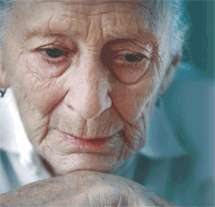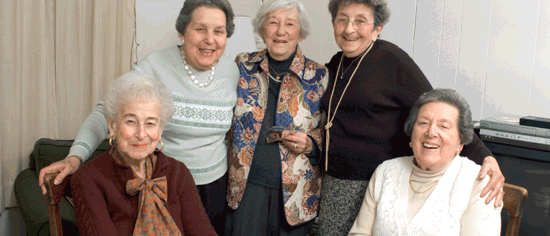 |
alone again
By Bert Tippett
The needs of a quickly expanding population of seniors have created many challenges for American society and government. Veteran editor Bert Tippett tackles the issue head-on with practical advice on how the local church can minister to widows.
|
It all started when a pastor friend asked if I had read “The Widow’s Might” in the January 2008 issue of Christianity Today.
I had not read the article, so he brought it by. In it, Miriam Neff described the plight of widows, including her. She called widows “the invisible among you.” Among her observations:
-
Approximately 800,000 women per year join their sisterhood.
-
60% experience serious health issues the first year. One-third of widows meet the criteria for clinical depression a year later.
-
Most experience financial decline.
-
Many drift from the choir, to the congregation, and, eventually, all the way to the back.
“We move from serving and singing in the choir to solitude and silent sobbing, then on to find a place where we belong,” she says.
She had my attention.
Face to Face With Widows
My pastor friend told me he had not considered the special needs of widows in his congregation. Neither had I, but I felt compelled to learn more.
My wife Dianne and I were scheduled to speak at a retreat for senior adults in March, so I included time in the program to recognize widows. I cited some of what Mrs. Neff had said, then invited the widows attending the retreat to stand. We gave them an ovation for their courage.

After the session, a couple of ladies stopped me and said how much they appreciated the recognition. Then they began to share their stories. One had lost two husbands and two children. No sooner had they finished than an attending pastor came to me and said, “I have several widows in my church, but I have not thought about how to minister to them. May I have a copy of that article?”
Since then, there has scarcely been a day I have not considered the subject of ministering to widows.
-
I did a biblical word search on “widow” and learned that:
-
God commands people to protect widows (Ex. 22:22, Deut. 24:21).
-
God provides His own protection for widows (Jer. 49:11).
-
Special blessings accrue to those who provide for widows (Deut. 10:18; 14:29).
-
Neglect of widows is a sign of spiritual poverty and invites God’s judgment (Isa. 1:23,
Deut. 24:17, Mal. 3:5).
Widows Can Minister
Widows have been a source of blessing to the Church and to God’s people. Both Elijah and Elisha benefited from the care of widows. Jesus pointed to a widow as an example of generosity.
A widow was also a source of great blessing to me and to my family. Early in my ministry, Dianne sent me to the store to buy groceries. Only she and I knew that the money I took with me was all we had left to meet our needs and those of our infant son.
The store we frequented was owned and run by a widow in our church. The income from that store provided for her and her five children. It may not have been more than barely adequate to meet their needs.
After I bought our groceries and returned home, I was unpacking the bags when I found four $10-bills in the bottom of one bag. I immediately phoned the store to report what I had found, but our friend cut me off in mid-sentence, saying, “Anything you take out of my store is yours.”
I knew then that, somehow, when no one else knew of our needs, God had spoken to her, and she had responded.
Recently, I interviewed several widows, asking them, “How did it feel to lose your husband?”, “Did your church meet your needs?”, and “What advice do you have for ways we can help?”Loss of Contact
The ladies we talked to confirmed what Mrs. Neff said: “Studies show that widows lose 75 percent of their friendship network when they lose a spouse.” One told me that her greatest sense of loss was the loss of contact with her husband’s family and their mutual friends. She was surprised to find that it was almost as if she had died as well.
However, widows often find great understanding, encouragement, and support from others within their “sisterhood of sorrow.” Grief counseling groups are helpful to some. Others just enjoy the company of Christian friends.
One lady said, “Don’t treat me like I’m single, because I don’t feel single.” She added, “Don’t ask my children how I am doing; ask me.”
Awkward Situations
“I don’t know where to sit when I go to church,” a widow said. It wasn’t that she didn’t have friends there, but she felt she might be imposing to sit with a family without being invited.
In contrast, another widow told me, “I never sat alone at church. Someone always came and sat beside me. I can name them today.”
The point is that we need to reach out to widows, rather than waiting for them to reach out to us. They need us to be open and inviting as they adjust to one of life’s greatest quantum shifts.
Inappropriate Comments
Some of us can be thoughtless in things we say. One widow related that statements like, “It’s time to move on” or “You need to get past this” don’t help (even if they are true). Grief takes time, more for some than for others.
Even worse are the attempts at humor. “Don’t say ‘It’s a good day if I’m above ground,’ to someone who just buried a spouse!” Questions like, “Do you plan to remarry?” should be thought through before being asked.
On the other hand, several told me, “Keep talking about my husband.” They treasured the memories of his life, both their own and those of others. We need to be sensitive, but widows often want us to recall their husbands, even though we may have to understand the awkward tears those memories may evoke.
Opportunities for Service
Several said that being able to serve others was a great help to them in healing their own grief. One volunteers at the hospice care facility. Another said that the death of her own husband has caused her to pray more fervently for the needs of others. Still another teaches and supervises K-5 at a local Christian school.
Perhaps our churches could find ways to plug widows into places of service.
Patience, Please!
Coping with the loss of a husband is an individual endeavor—different for each widow. Some wanted to be included in group activities; others wanted to be left alone for a time. “For five or six months, I did not want to visit or be visited,” one told me. “I learned I couldn’t attend funerals.”
Another had been very active with her husband. They had been socially oriented, enjoying activities with other couples. After her husband died, she did not feel complete without the fun, food, and games they had enjoyed together. She found a church where she was accepted and embraced—made to feel like part of the group.
Knowing there is no “one size fits all” solution to the loss of a mate should spur us to be patient to learn what best meets the needs of each of those we are attempting to help.
I want to thank those whose candor helped me better understand the circumstances of widowhood: Barbara Foster, Brenda Griggs, Peggy Hampton, Glenda May, Lorene Miley, and Helen Wall. I suggest that you pray for them and for other widows and widowers who live daily with the greatest loss of all. Then look around your circle of acquaintances to see if you can find someone to help.
ABOUT THE WRITER: Bert Tippett is director of church relations at Free Will Baptist Bible College.
What can your church do for widows?
-
Recognize them. Mention them and their special status publicly.
-
Use them. Utilize their gifts in the church and community. Invite them to share their experience.
-
Minister to them. Change the oil in their car. Have the youth group rake their leaves.
-
Advise them. Help them manage their finances. Pay someone to prepare their tax returns.
-
Comfort them. Sit with them in church. Send cards. Make phone calls.
-
Talk to them. Ask how they are doing. Recall memories of the husband they lost.
|

